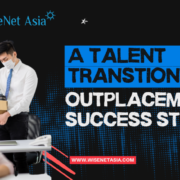This article is researched and written in collaboration with a Group HR Director at a Malaysian telecommunications MNC with over 20 years of regional HR experience across Malaysia and Singapore.
When Petronas announced plans to retrench 5,000 employees—10% of its workforce—in February 2025, it sent shockwaves across Malaysia’s corporate landscape. But this wasn’t an isolated incident. From TikTok’s 481 layoffs in Malaysia to Lazada’s cuts across Singapore, we’re witnessing a strategic workforce realignment that demands both HR leaders and employees to rethink their approach to career resilience.
After two decades in HR across Singapore and Malaysia, I’ve seen economic downturns come and go. This current wave feels different—less about financial desperation, more about strategic positioning for the future. The unemployment rates tell a story of resilience: Singapore maintains 1.8% unemployment while Malaysia sits at a decade-low 3.1%. Yet layoffs are happening across sectors, driven by digital transformation, AI automation, and post-pandemic workforce corrections.
The numbers behind the headlines
Singapore recorded 12,930 layoffs in 2024, actually down from 14,590 in 2023, according to Ministry of Manpower data. Malaysia’s Department of Statistics shows a different picture—while overall employment remains strong, specific sectors like technology and manufacturing are under pressure. Local tech companies including TikTok and Lazada have implemented significant workforce reductions, reflecting global industry trends where over 141,000 tech layoffs occurred worldwide in 2024.
The manner of these layoffs reveals how unprepared many employees were. Dyson surprised employees with sudden layoffs in October 2024, with one worker describing how “people were grabbing their bags… they were actually leaving. People are shocked.” At Lazada, former employees created WhatsApp support groups, with one noting “the market is rather soft right now” for job seekers.
These aren’t desperate companies cutting costs—they’re strategic moves. Petronas framed their massive retrenchment as necessary for “long-term survival,” not financial distress. TikTok’s cuts came from shifting to AI-powered content moderation. The common thread? Companies are preparing for a fundamentally different future of work.
What HR leaders must get right
Having guided organizations through retrenchments, the difference between success and disaster often comes down to execution. The Lazada case study offers a masterclass in what not to do—failing to consult unions, inadequate initial packages (2 weeks salary per year), and poor timing during festive season. Result? Brand sentiment plummeted from 31.9% to 11.3% positive.
Legal compliance varies significantly between our markets. Singapore requires Ministry of Manpower notification within 5 working days for companies with 10+ employees. Malaysia demands “just cause” documentation and follows “last in, first out” principles. But beyond legal minimums, smart HR leaders are providing comprehensive support packages above statutory requirements. PropertyGuru demonstrated best practice with 1 month salary per year of service, 3 months extended medical insurance, and comprehensive career assistance. The investment in dignified treatment pays dividends in maintaining employer brand and employee trust.
Critical communication principles I’ve learned: Conduct private individual meetings before public announcements, provide clear business rationale, and address survivor guilt among remaining staff. Documentation is crucial—both for legal protection and employee clarity about entitlements.
Building employee resilience in uncertain times
For employees, the current environment demands proactive preparation rather than reactive panic. Financial planning remains fundamental: emergency funds of 6-12 months expenses, immediate debt reorganization such as consolidating high-interest loans, and exploring side income opportunities that provide 20-30% monthly buffer.
The skills conversation has evolved beyond generic “digital literacy.” Future-proof capabilities now span all industries: finance professionals need data analytics and AI literacy, healthcare workers require cybersecurity awareness for patient data, retail staff benefit from understanding automated inventory systems, and even traditional manufacturing roles increasingly demand digital twin architecture knowledge. The common thread isn’t technical mastery—it’s digital fluency that complements human expertise.
Singapore’s SkillsFuture credits provide S$400 at age 25 with regular top-ups, while Malaysia’s HRD Corp (formerly HRDF) offers extensive funding for reskilling with claims up to RM1,300 per person per day for approved courses. 90% of professionals in both countries recognize the need for continuous upskilling—awareness isn’t the challenge, execution is. Most people postpone learning until crisis hits, choosing Netflix over night classes or weekend courses. The professionals who survive layoffs are those who dedicate 2-3 hours weekly to skill development, treating it like insurance premiums rather than optional extras.
Career resilience now means embracing portfolio careers over linear ladder climbing. The professionals thriving in this environment maintain multiple income streams, build thought leadership through sharing expertise, and view career changes as growth opportunities rather than setbacks.
The cultural dimension that matters
Understanding our regional context shapes effective responses. Malaysian culture’s emphasis on job security creates particular anxiety around layoffs, while Singapore’s multicultural workforce brings diverse expectations about severance and support. Smart HR practices acknowledge these nuances.
The youth unemployment challenge is particularly acute in Malaysia at 10.4%—significantly higher than the overall rate. This suggests systemic skills mismatches that require targeted intervention from both employers and educational institutions.
Government support exists but requires navigation. Singapore’s Jobseeker Support Scheme provides up to S$6,000 over 6 months for eligible individuals. Malaysia offers various HRD Corp programs, though uptake remains inconsistent across industries.
Looking ahead with clarity
Three key insights emerge from the current landscape. First, these layoffs represent strategic positioning, not economic distress—companies are preparing for AI integration and digital transformation. Second, success favors the prepared—both HR leaders with robust retrenchment frameworks and employees with updated skills and financial cushions. Third, career resilience requires mindset shifts from linear career thinking to adaptive portfolio approaches.
For HR leaders, invest now in developing comprehensive retrenchment policies, outplacement service relationships, and manager training for sensitive communications. Don’t wait for crisis to build these capabilities.
For employees, the message is clear: treat career development as continuous insurance, not episodic upgrading. Build emergency funds, maintain professional networks, and develop skills that complement AI rather than compete with it.
The organizations and individuals thriving through 2025’s layoff wave share common traits—they prepare proactively, communicate transparently, and adapt continuously. In our rapidly evolving regional economy, these capabilities aren’t just advantages—they’re essentials for sustainable success.
Disclaimer: The opinions in this article are those of the author and do not represent Wisenet Asia Pte Ltd.
Sources:
Reuters. (2025). Malaysia’s Petronas to cut 10% of workforce, not exiting Canada, CEO says. [online] Available at: https://www.reuters.com/business/energy/malaysias-petronas-cut-10-workforce-not-exiting-canada-ceo-says-2025-06-05/
Bloomberg. (2025). Malaysia’s Petronas to Cut 10% of Workforce on Profit Slump. [online] Available at: https://www.bloomberg.com/news/articles/2025-06-05/malaysia-s-petronas-to-cut-10-of-workforce-after-profits-slump
Marketing-Interactive. (2024). What do TikTok’s layoffs in Malaysia signal for AI development in the country? [online] Available at: https://www.marketing-interactive.com/tiktok-lay-off-malaysia-gen-ai
Vulcan Post. (2024). From Lazada to Amazon: Here is a list of companies laying off in 2024, including in S’pore. [online] Available at: https://vulcanpost.com/850132/companies-laying-off-2024-including-singapore/
The Star. (2025). Fewer Singapore retrenchments in 2024 than in 2023; resident employment grew: Ministry. [online] Available at: https://www.thestar.com.my/aseanplus/aseanplus-news/2025/01/27/fewer-singapore-retrenchments-in-2024-than-in-2023-resident-employment-grew-ministry
Malay Mail. (2024). ‘People are shocked and have low morale’ as Dyson implements surprise layoffs in Singapore. [online] Available at: https://www.malaymail.com/news/singapore/2024/10/02/people-are-shocked-and-have-low-morale-as-dyson-implements-surprise-layoffs-in-singapore/152321
Singapore Legal Advice. Retrenched in Singapore? Know Your Employee Rights. [online] Available at: https://singaporelegaladvice.com/law-articles/retrenched-singapore-employee-rights/
MS News. PropertyGuru retrenchment affects 174 employees, they’ll receive 1 months’ salary per year of service. [online] Available at: https://mustsharenews.com/propertyguru-retrenchment/
Workforce Singapore. WSG SkillsFuture Jobseeker Support scheme. [online] Available at: https://www.wsg.gov.sg/home/individuals/jobseeker-support
Human Resources Online. (2024). 91% of Malaysian employees intend to upskill or reskill in the next 12 months. [online] Available at: https://www.humanresourcesonline.net/91-of-malaysian-employees-intend-to-upskill-or-reskill-in-the-next-12-months
—End—



